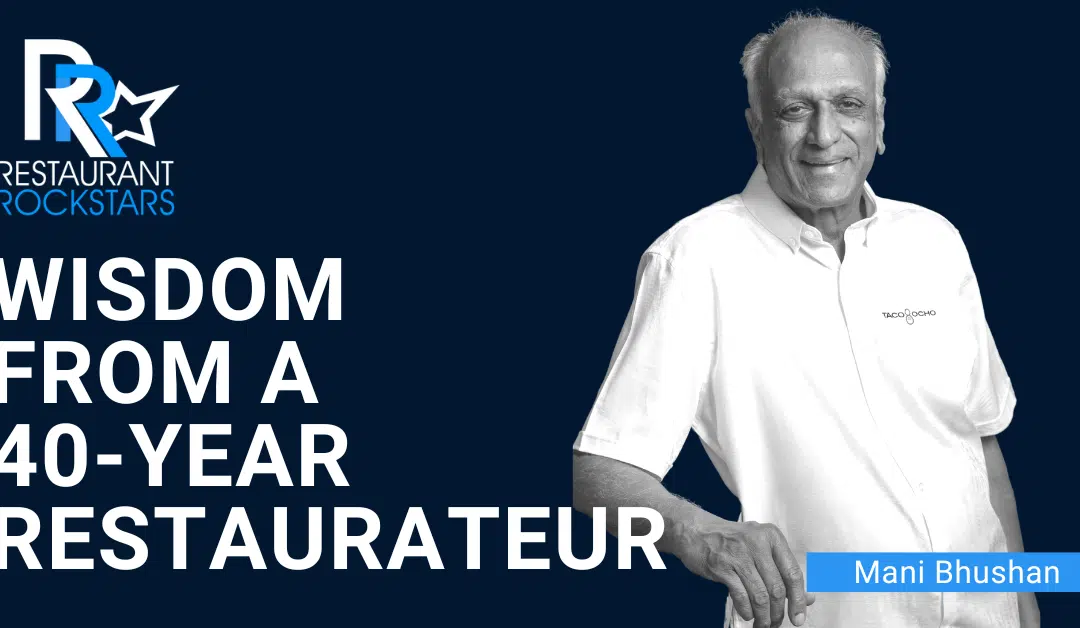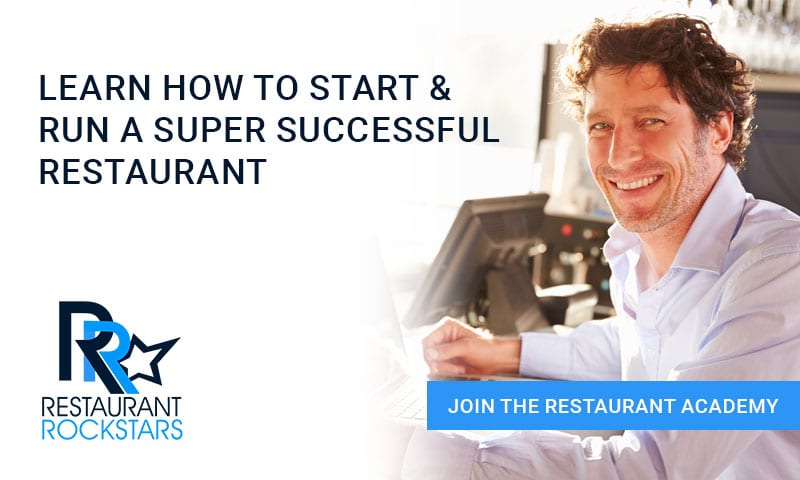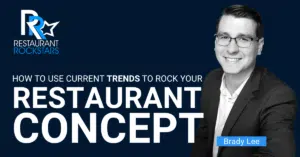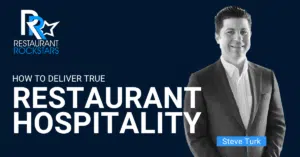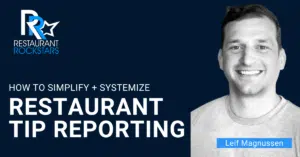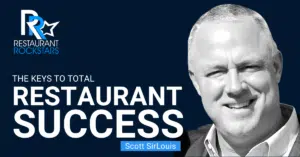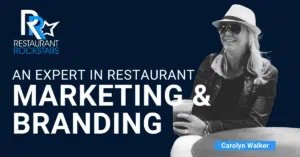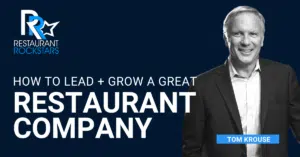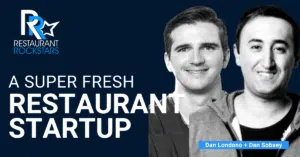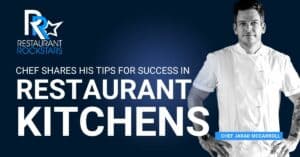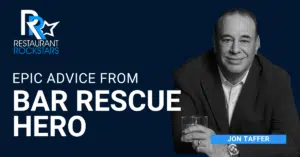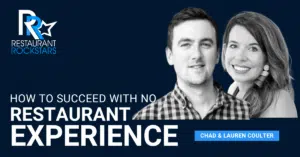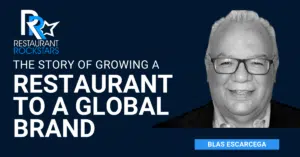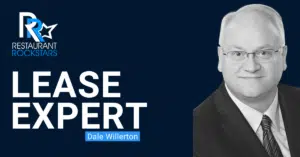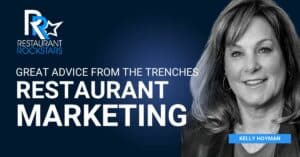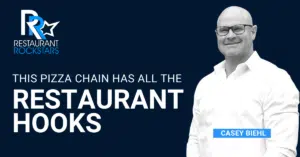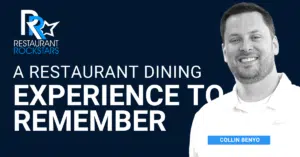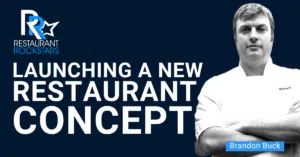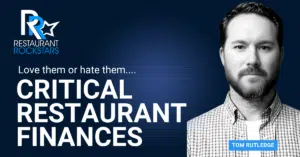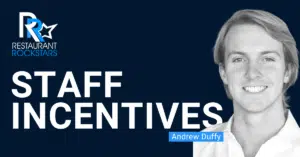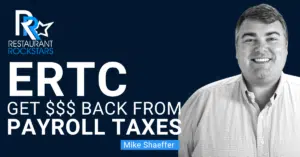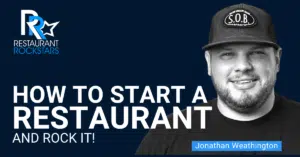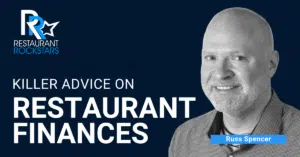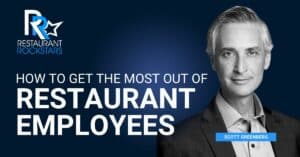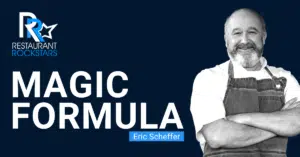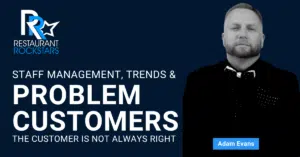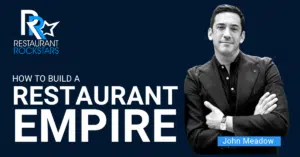Restaurant Rockstars Episode 334
This 40-Year Restaurateur Shares Actionable Wisdom
LISTEN HERE OR ON YOUR FAVORITE PODCAST PLAYER
Click the video below.
We all know that being a restaurateur can be greatly fulfilling, but also incredibly challenging.
During these times, running restaurants can certainly take their toll, but after 40 years, this passionate restaurateur keeps forging ahead working three meals a day!
In this episode of the Restaurant Rockstars Podcast, I’m speaking with restaurateur Mani Bhushan of Taco Ocho in Dallas. At 70+ he is still running circles around the competition!
After building a long successful career with a famous national chain, much later in life, he decided to open his own restaurant and then grow it to four locations.
Interestingly, Mani’s of Indian descent but his restaurants are Mexican concepts. Why? You’ll have to tune it to find out.
Listen as Mani tells us:
- The importance of treating every guest like an old friend
- Why refusing to compromise on quality and authenticity matters.
- Inspiration and key start-up lessons he learned.
- What keeps his customers coming back for more?
- How to continue offering value for money during inflationary times
- The magic formula and secret to restaurant success
- Unique catering ideas
And of course, this veteran restaurateur also shares his best advice to others wanting to start a restaurant!
Watch or Listen to this episode and then go out and ROCK your Restaurant!
Roger
Connect with our guest:
Instagram: @tacoocho
Facebook: @tacoocho
It’s high standards. I, I don’t like to, even during the toughest times, I never lowered my quality of my food, our abortions or so on. So I’m kind of true to what I believe. I believe success is, if you’re passionate about something, and you really execute every day, with passion, you will succeed, whatever you do.
Welcome back, everyone. And thank you for joining me on the podcast. Once again. This week’s guest is super interesting what a story. Mr. Mani Bhushan migrated to this country from India. He’s in his 70s and still working his four Mexican concept locations in the Dallas area that he created. He worked for Taco Bell for years, but the inspiration really came from marrying his wife who’s from Mexico, they do everything the authentic, Old World way, create everything from scratch, and it’s all about high quality. So of course, we’re going to be talking about how he’s running these different locations in his 70s during these most challenging times, and everything goes along with running a very successful restaurant concept. But all the challenges and pain points are there. So you want to stay tuned. Thanks to the sponsors of this week’s episode Whirks, The Birthday Club, Zinch and the Restaurant Rockstars Academy. If you haven’t heard of the academy it is a turnkey series of operational systems for your business that really help you dial in your profits. train your staff to be service minded and deliver amazing experiences with service and sales combined because sales are the lifeblood of your business. powerful marketing ideas that are proven to deliver new and repeat business that have tremendous return on investment and are trackable all the systems that you need in your operation. Please check that out at restaurant rockstars.com Now on with the episode.
You’re tuned in to the restaurant rockstars podcast powerful ideas to rock your restaurant. Here’s your host Roger Beaudoin.
For restaurants large costs can add up fast broken kitchen appliances, roof leaks overhead cost during a slow season. But the traditional loan process is too slow, you need to learn about Zinch a direct lender that makes financing fast, simple and built around your needs. If you’re generating over $10,000 in monthly revenue, and you’ve been in business over six months since can fund up to $250,000 in less than two days. Just fill out a simple online application, provide copies of recent bank statements and you can get an approval within 24 hours. See how much financing you can get with Zinch. Right now Zinch is waiving application fees for my listeners, that’s a $250 value, go to financingthatworks.com. Once again, that’s financingthatworks.com loans made or arranged pursuant to a California lenders law license. restaurant owners and managers
Listen, it’s not too late to claim your employer retention credit, but you have to act soon. If you haven’t heard of this, your business can receive money back from the IRS money have already paid in payroll taxes. Nothing you do today is more important. Now this is free and clear cash that your business is owed by the government, the ERC program is available if your operation had 500 employees or less, you had to shut down or partially suspend your business or you had at least a 20% decrease in business due to COVID 19. During any quarter of 2020 and the first three quarters of 2021. Now your business can get up to $7,000 per employee per quarter for 21 and up to $5,000 per employee in 2020. Now if you have just 10 employees today and meet the requirements, you can receive up to $260,000 back in a refundable tax credit that you don’t have to pay back now the faster you apply, the quicker you get the money but you must do it soon. You can use the money for any purpose payroll cost of goods, business improvement or other expenses. Again, you don’t have to pay this money back now works is a company that will do everything for you to get the money that you’re owed. Now I’m speaking from experience with Whoirks my restaurant received big checks in all available quarters and Whirks people and process made it easy for a no obligation consultation. Click the link in the show notes to this episode and speak to them with no obligation. You pay nothing until they get you the cash back now.
Welcome back everyone. This is the restaurant rockstars podcast and today we have a very interesting restaurant story that really begins in the country of in India with me today is Mani Bhushan Mani, how are you today?
I’m doing very well. How are you?
Thank you so much for being on the show again. You have a fascinating story and I can’t wait to get into it. But let’s start about talking about India. You emigrated to America? I believe it was in my 70s 72. Alright, let’s start with India. Did you ever work any restaurants in India?
No, never. Okay. I worked for an agency as an account executive.
Well, you know, I did the very same thing in Los Angeles. So we have something else in common.
For about two years in Bombay, we’re leading ad agency there, came to study here, and then kind of started working in restaurants and then kind of stayed in the industry.
Did you meet your wife? First? You were in graduate school? I understand. Was it Louisiana?
No, I was in Louisiana. So yeah, we went to a convention. And then I saw her and then we talked and then I dated her for a year, and then eventually married her.
Did she have any restaurant experience? Mani?
No – She’s a dentist.
No kidding. Oh, that’s so interesting. All right. So you got out of graduate school? Did it take a while before like, where did the restaurant passion come from? I understand you work for Taco Bell and some other larger companies. But tell us what,
while I was going to school, I work for Jack in the Box. And then I became a store manager there. And then I was pretty successful. And I was promoted to a district manager in about a year and a half. So somehow, I got hooked there. What I liked about most was, you took people who never had any direction, and you spend time and you make them winners. And when they succeed, you get this great gratification. So I knew to win in this business, the only way to do that is to train your people really spent time and make them believers. So I really enjoyed doing that with the people. That’s why I stayed in the business.
Wow, that’s such a foundational element of hospitality, which really drives our business forward, it really starts with the people and how well trained they are. And if they understand the finer points of guest service, and what guests are really looking for. So you really develop that at a young age. So you stayed in the restaurant business for quite a while Did you always have the dream of opening your own restaurants,
you had thought about it and then kind of in the back of my mind. So I stayed in the industry, I kept growing. So I, my responsibility went from $6 to 13, to 54, to 58, to almost close to 1800. So and I said to myself, I’m doing well, I’m enjoying what I’m doing. I’m really making a lot of people succeed. So I stayed in the business. But in the back of my mind, especially after I went to Mexico to ask our parents for her hair, that’s the normal culture. And ask the Father for her head. And then I ate the food in their home. It was very different than the Tex Mex were used to. And then I went to Mexico City with her, you know, when eating some really really nice places which are very modern and nothing like Tex Mex. So I was inspired by it. And the back of my mind. I said one day, I want to open something cool, something healthy, something where you can offer different choices, flavors, they’re not used to so it kind of stayed in my mind for a long time.
Yeah, that’s so interesting. You mentioned Tex Mex was people think of Mexican food or Mexican cuisine as as being authentic. But in many cases, it’s more Americanized, but you’re talking about really traditional. It’s such a part of the, you know, the culture in Mexico. And you can travel the different regions of Mexico and the flavors and the nuances change, of course, but it’s all about the fresh, natural ingredients, and the flavors and the spices and all that and it sounds to me like you’re really inspired by that you tasted a lot of delicious food. And you really immersed yourself in that culture. And that stayed in your mind for so so long. And then you knew that someday when you were going to open your restaurant, you wanted it to be authentic, you know, you we obviously eat Tex Mex here in America, but very few people traveled to Mexico and really eat the street food and the culture, the traditional Mexican food and it just sounds to me like that’s what what has inspired you all along? Is that true?
That is totally true. I mean, so we use many different chilies. I mean, I have one person doing nothing but crap all day. Because I believe we have done a lot of damage to people’s health by serving processed foods. Everything comes in a bag. So we said we’ll never do that. So we make we make everything fresh. So so it’s very labor intensive. So it’s kind of challenging for profitability, but I didn’t want to deviate from that.
Well, you know that story I was on your website and first of all, the photography is fantastic. It really draws you in first of all the colors and the vibe rinse see of your stores is beautiful. But then the food photos are so well done and the margaritas it’s like, I’ve always thought that a great restaurant website really should give you a taste of the experience before you even walk in the door and make you want to go and you’re certainly does that. So I think you’ve done a great job there. Thank you. Yeah, so let’s talk about Taco Ocho. Now that name means eight in Spanish? Where did the name come from? And tell us about that.
Originally, when I started a concept, I said to myself, I’m not just going to bring just Latin food, just just Mexican food, I want to bring Latin flavors. So when we opened our food has flavors from a different Latin American countries. So to do that, so consistently, we drop one item, we need to do something else to make sure we get any given time we have food from a different countries.
That That makes perfect sense. Well, it’s wonderful. I can only imagine what what the food actually tastes like in person. I’m getting a really good feel for it now. But Latin inspired eight different regions. That’s that’s, that’s wonderful. So your restaurants are all around the Dallas area, are they and they’re in different cities? But they’re all very close to Dallas, Texas.
Yeah. Behind the Dallas metro area, correct? Yeah. I don’t have nothing in Fort Worth. Yeah.
Okay. Well, I’m sure that’s coming. I have a lot of people that listen to this podcast that want to start their own restaurants. Can you tell us about the whole process? And I know this goes back to I believe it’s 2011 when when you started the first taco, but what was that process? Like? Obviously, you had to have a plan in mind and you know, get financing and then open the doors and hire people and put the whole concept together. Tell us about your story. How did that all come together?
No, mine was a little different. All right, please, I left, I left, I left a large company in 2006. And at that time, I said, I’m not going back to work for a large company. I don’t want to travel five days a week, and so on. So I spent four years traveling, cooking, learning different techniques and perfecting flavors. Okay. After I did that, I actually hired a sous chef from four seasons in Mexico City, and had him create the sauces to make it very easy to execute that in the store on a fresh basis. Because you know, all the high end stores, got a saute pan, cook the stuff and our price point, we do the same thing. So once having done that, I did a taste panel study to make sure people actually care for what I’m selling. So having worked for big companies, and knew how to conduct that. And then luckily, I have a daughter who is in marketing, she worked for advertising agencies in New York for a long time, she came over with her friend and did the taste Panel Study for me. Right. So then we realized we had something good. And eventually not everything in the paddle have made it. And after that. We in 2011, it was the middle of a recession. You couldn’t get any money from anywhere. So I pretty much cashed out some more money, find more 401k and borrow any money from anybody. And I made a big project less than wall all I need to do. So it’s very cumbersome process, you got to get the permit. Perfect. The recipes make the recipe manual. So and even with all my experience, you’re still challenging. I mean, luckily, I could afford to not work for four years. So that helped a lot. So but I was passionate. I lived in the grocery stores, Mexican and Latin grocery stores. bringing food every day. I almost got to travel by my wife’s he says you’re making too much food, but I wanted him for food.
This is great. When can you still cook today? Do you still do any cooking?
I don’t like to cook much at all. i Okay, I’m inspired. I sometimes wake up at three or four in the morning and dream up a recipe and then go to the restaurant and cook it. And then I perfect it like it takes almost like a month to perfected. And then we launch it.
How often does that happen? Because you probably have a staple menu that stays the same. But then you bring in new new flavors and new dishes from time to time. And then you try them out on people and see if they liked them. Or how does that process work for you.
I learned having worked for a big company was when they did lots of research and it flooded. And I said no. You have to go get more authentic feedback from the customers. So when I make something, I take it to my new customers, as well as my regulars and say Hey guys, I’m not sure he felt like this or not. Tell me what you think. Otherwise, if you if you act like you really like it, they’ll tell you what you want to hear,
of course, right? Right. You want authentic answers. Sure.
I want authentic answers when I say hey, I’m not sure I mean you know I like it. Both of my employees don’t like it. And my wife doesn’t like it. So tell me, I mean, I want to ask customers, so that way you get true feedback. So one time, only one time, I launched a product without their feedback, and I’m pulling that. Tomorrow will stop selling that. So the lesson is never learned anything without talking to your real customers.
That’s really sound advice. Okay, so let’s go back to the first store, you worked out for a while before you open number two? And number three, tell us about that process. Like how long was the first one open? Was it an overnight success? Did it take a while to get there? Not at all challenges.
So in 2011, there was not much going on because of the recession. Yes. When you’re starting out, not that big shopping center owners will even touch you. They don’t even want to mess with you. They want to give it to very established businesses. So I had to find a center, which was virtually empty. There’s nobody there in the shopping center. And the landlord said, Okay, I’ll build it out for you. So you don’t have any build out costs. You wanna take a chance? And I said, Okay, I’ll go in, and those in a trade area, were mostly offices. And I said, Okay, let me try. And that was a mistake in the sense, we still open there, that’s a mistake. Because when you make authentic made from scratch food in the office trade area, people still think you as a lunch play, they don’t get that you’re doing all this so that you know, it’s a good lunch place to go in. So I learned the lesson. So when I opened the second store, I went to a suburb. And this time, I made sure that the income levels are pretty consistent to what I’m trying to serve. And then there, I started getting families. And they said, No, I want a case study for my kids, can you get me nachos, none of these were on the menu before. So we had to adapt and kind of expand the menu to succeed in the suburbs, because we knew, eventually, we’re going to brand our restaurant as a neighborhood restaurant, where people can come hang out, feel comfortable, we’ll know everybody, we could talk to everybody, we know who you are. And we know what you want when you walk in. So that’s the kind of feel I wanted to give. So subsequent to that, all the stores I open were in neighborhoods where we could actually do that. So I live in a city called Forman. And in the we open a restaurant there, I work there all the time, I actually worked the bar several times there. So I know all the customers if I’m gone for a month or so they miss you,
at least when did he sell a place. So it’s been fun, it’s actually placed, you get to talk to your neighbors. And it’s fun. I mean, I’m enjoying it.
Sounds to me, like you make friends with every customer, whether they’re regular not coming through the door, you recognize the people that are always patronizing your businesses, but then new customers all the time feel like they’re old friends, just by virtue of the hospitality you deliver. That’s that’s the energy that you’re giving off, you know,
you think it’s people are really fundamentally very, very nice. All you have to do is to go open up. So let’s say a brand new customer comes with a three year old, and I go talk to a three year old, but I tell the three year old about my granddaughter, and I pull my phone and show her my granddaughter’s picture, all of a sudden, those people say, Oh, my God, this guy’s daughter, and we all get along so good. And I mean, I mean, that’s my personality. So I mean, it comes naturally to me.
How far away are the stores from each other? Are they you know, driving distance? Half an hour? So what would you say that you do? From my
home? Yeah, to the Makini. Store is 45 minutes. In the Richardson store is 30 minutes. Flower mom store is eight minutes. Preschool is about 25 minutes. I see.
To see your customers trying the other locations as well. Are there any differences between them? Are they all really really the same? Or are they unique in their own different way,
the food is exactly the same. Every store looks different because I didn’t want to come up as a company which was exactly same stores. So that’s why I made each store different, different with different colors and I hired a mural artist who could paint different things in each store can give it its own look. But I run into customers who ate at the farm on store but they weren’t near Frisco or so I see that constantly. So our biggest challenge now is not having enough customers because in a city like Dallas Fort Worth, you have to have at least 20 stores to have the market presence. You have four stores, you really don’t have that much presence. So it takes time for you, you know Grow customer base? Yes. Yes. Yeah. So and that’s what we’re doing. We’re consistently trying to acquire new customers. So that way we can hit the PSAs. We want to hit Yeah.
What did you study in graduate school? Because besides your career experience, it sounds like you might have studied business in school. You’re very savvy.
Yeah. So my undergraduate was in business, then I have an undergraduate degree in journalism and advertising. And then eventually my master’s degree where I went to school of business.
Oh, same with me. I had an undergraduate and graduate business degrees as well, we have so much in common Mani, thanks for sharing. So let’s talk about the menu and what makes it special. Now I understand and you’ve said that authenticity is very important. And the you know, really high quality ingredients, making everything from scratch is very, very important to you. What are some of the signature special dishes that people really enjoy? In your restaurants?
We make a lot of stuff for vegans as well as carnivores. Okay. So my product mix on vegan is almost as high as 25%.
That’s, that’s really remarkable. Is it? Is it the nature of certain areas in Texas where people are very, you know, vegans, and
no, not necessarily because more and more younger people are becoming vegan right now? Yeah. So it’s originally it was probably when I first started selling vegetarian status in 2011. It has more ethnic customers, more from Asian ethnic customers. But now it’s pretty mainstream. I have people drive from 3040 miles to come and eat our lunch at our restaurants, because we make from real vegetables. So we don’t sell Beyond Meat or any other. So we make this and then we’re kind of creative. Let me give you an example. Okay, I wanted to create something like a hash on our brunch menu. So I took bell peppers, onions, plantains, sweet potatoes, regular potatoes, and episode day, which is the Mexican leaf, which kind of gives distinct flavor, and then I set up to create something very distinct for that. So I took coconut milk guajillo chilies, okay, and then made a special sauce. And then we started the pan cook that and syrup to vegan customers. And that’s kind of out of the box. Still bring you know, in Latin America, coconut milk is widely used in Colombia. So you bring Mexican chili, and you kind of create an inventive flavor. And then you offer and all of a sudden, you have a unique item on the menu, which people really likes and vegan people love that. Okay, so then we use a lot of chickpeas where I grew up Okay, so I said vegan people want we are breakfast is very popular, they wanted something breakfast wise, which is vegan. So I use the chickpea flour to create a batter so that I could make a taco for vegetarians and vegans which has no egg whatsoever and it was a phenomenal success. So we got to go go out of the way like the restaurants do in Mexico City and kind of take little liberties to bring their flavors and kind of still staying core throughout Latin culture, but different take liberties and creating new items.
Are there any other similarities in say spice levels between you know you growing up in India and spices very important to the food and Mexican? Do you have different levels of spice? Do you ever combine the two cultures with a little influence from India in your Latin inspired food does that happen to you?
For example, we have a lot of tamarind Indian tamarind tower in the tambor tamarind is very popular, but they don’t necessarily use that to cook something. So I took the Tamarin mixed with different chilies and made a sauce. And we use that to cook up make a case study for vegan people. So I’ve taken liberties to kind of because so I go to Indian store and buy the concentrate. It’s a lot easier to get from Indian store than to go get a Mexican store. They don’t sell concentrate. I see. See, but the concentrate is still very pure. No additives in it. Yeah. So actually, I have been doing this to get to give you an example. In Ecuador, there is thing called Carnac. Colorado, it’s basically beef cook with some choice. Okay, so I, I said okay, I want to take this and see what I can do with it. So we had a beer in it. Okay, and then add a little bit more flavor. And then we made a taco with a top little bit of Slava, take them out on it. So we still stayed pretty core, but made something unique to our own menu. So that’s why I’ve been so it’s kind of fun working on new things so I don’t get bored.
Well it’s also keeping you young. I don’t see you ever retiring because you love you know you love your customers, you love the food you love just the you know the spirit of your restaurants and totally
I work in restaurants all the time. It’s so fulfilling. Yeah, this morning, I went to work in Macquarie and then open the store because I worked there for a while and then drove back home. And now I’m here talking to you.
Every day is different, isn’t it? Totally. Yeah. So you mentioned to really gain a presence or market you know market share in that area of Texas you need 20 Plus stores do you have you know ambition to grow your your company much larger than it is you can open many more stores.
I want to open few more products. I want to open up probably open six more stores, but not right now. Right now. It’s a very tough time. The food cost is crazy right now. Right? I used to pay for a box of eggs. 15 bucks. It went as high as 72 bucks.
Yeah, I’m hearing eggs are just out of control completely. And there was a time when avocado was very expensive. Is that still very expensive? Now? Have you seen
not anymore? So a few months ago, the chicken went from 2.99 to 5.74 pound. So everything across the board went crazy. And then labor wise, you could get a decent cook for 12 $13. No, I have to pay 17 $18. And I still can’t buy and I can’t even staff my stores at present. It is still a struggle to hire people.
I was going to ask you that this labor crisis has been going on for quite some time. And it’s not just the restaurant industry. It’s all industries. But restaurants have definitely been hit pretty hard. And like you said, We’ve never paid that much money for cooks. And now you can’t get a decent person for less than you know those high wages because other industries can afford to pay more. I mean, it’s a real challenge. How are you having trouble staffing the stores daily? Is that affecting service at all?
Yes, it’s it’s affecting the food quality in certain states, because you can’t find good enough cooks like you used to find old days. So you have to constantly stay on top to make sure you’re training these cooks who don’t have real skills. And staffing. Lunchtime is a problem because you’re competing with other places where they can go get a warehouse job. So the whole economy changed. After COVID There was so much PPP loans given and all of a sudden, all these warehouses have opened up and they are succeeding. Now they have a lot of employees working there. And then all the grocery stores started hiring people to just pull the orders and take it to the car and they pay them 15 bucks an hour with benefits. So all the young people have decided to go there versus being working in a restaurant, and which you know, restaurants is not easy. No, it certainly isn’t. So that’s why it’s been a struggle. So we do everything possible to retain employees. But it’s been a it’s been a struggle.
And even harder when you’re open you’re open breakfast, lunch and dinner, you know, it’s not your your hours aren’t limited. So that must be even more challenging. Staffing all three that day parts, right?
Yeah, but we still have to come early in the morning, even if we did not open because we’re making from scratch. You cook beans every day, you cook rice every day, you cook the chicken finger every day. So if you’re doing all that, plus, you’re gonna hand dice, hand cut everything, you got so much labor involved in it. So I can start at 10 o’clock and open at 11 and be successful. So that’s why, since we’re coming so early anyway, it made sense for us to sell breakfast tacos in the morning. So that at least we could get some sales during those hours, which are not really productive for us.
Right? Absolutely. So are they full serve sit down restaurants that you have their full service, right? They are. And you obviously make everything fresh and authentic and you do so much prep? Is everything very quick to prepare once a guest or does it take longer?
Yeah, because we’ve done so much prep, it is pretty easy to cook. But our customers say we’re very consistent. That’s because we don’t cook ahead of time. So we let’s say we cook the meat and then we keep it there. And then when an order comes we saute pan cooker with the sauces. So just like a fine dining desk. So that’s why it’s consistently fresh. It’s never sits there and steam table.
Of course. So if you were to go back to 2011 You’ve got so many memories over the years of not just opening the first store but opening you know, the second and the third and the fourth. Are there anything any really crazy stories that you remember that you just can shake your head today and say I can’t believe this happened or I can’t believe we got through that. I mean obviously the pandemic is the biggest crazy story that everyone went through. But anything else really stand doubt you that you will never forget about.
No mean. So here’s a guy who was running large span, I mean, I had responsible for $1.4 billion in business. So I’m opening a store. So I’m stuck there, I worked there seven months, without a day off, to make sure I trained the people got the operations started losing money. So that was a kind of shock. You know what I mean? So my wife said, Come home anymore. But I had to do that to succeed. Yeah,
it’s definitely hard work in that. You know, very few people have that work ethic today that, you know, that we had, when we were growing up that we were taught either from your parents or, you know, the cultures we grew up in to succeed, you really have to apply yourself, you have to be work smart. You have to work hard, both those things together, and just be inspired by something and really develop a passion where it’s not a job, it’s like you really enjoy what you’re doing. And that makes all the difference. And that’s certainly your case.
Yeah, it’s like my son says, Dad, you’re stupid. You couldn’t, you could have bought homes where I live, and you can fix them, because you know how to fix them. You’re made a lot more money. So it’s not about the money. I want to have some fun.
Oh, you could have been flipping houses instead of making Yes, because
I help. My son and his wife kind of fix their home when they first bought it. And they bought it. And that home value appreciated almost four times. So he kept telling me how is buy homes here and fix them? Why are you doing this stupid restaurant thing?
Right, right. Oh, that’s funny. does. Does your family work in the business? Also?
Nobody does. My son occasionally helps me with marketing and so on. So he has a full time job. So I so I don’t think he or my daughter have no desire to work in the restaurants. And my wife. She can’t even recite five things on the menu. She can talk about all the dental stuff, but no, she, she she was she. She has no interest in my business.
But she must love the food, right? It’s all part of our culture.
Yeah, she loves the food. And she loves the fact that she keeps telling me, You’re so hard working. You never give up. You know what, that’s the way my parents instilled that in me get you up there?
Well, you know, your menu is very, very unique, but you’re also doing catering. So you’ve got, you know, catering boxes, and you do breakfast fiestas and business meetings and weddings and all that is that a big part of your business?
No, before COVID catering was almost like 25% kind of dropped at growing back. Because people are coming back to offices. And I see going back, like my store in Richardson, which was a major catering store because of its proximity to all the office buildings. So they were struggling for a while now this week, we have eight catering this week, including a catering for 200 people today. So it’s finally coming back as the people come back to the offices.
Yeah. You talked a lot about the training you did earlier in your career and the importance of developing your people. And those philosophies have obviously carried over into your store. Do you want to share any of your you know, specific training that you do your onboarding when you hire somebody new? You indoctrinate them into the culture of your business and what it means to serve the guests and hospitality. But what what do you do specifically, what’s special about your training?
Now we have a server book, which I always asked my people to share. And then sometimes they don’t do a good job. So that’s the reason why I go and work in the restaurants to see what’s going on how well trained they are, and constantly give sermons about, hey, we got to train these people, for us, for us to really succeed. So that’s an ongoing process in this business. You will have this training challenges every day. If somebody tells you, everybody in their stores are completely trained, they’re lying. Because execution is an ongoing thing. You have to stay on top of it every day.
Well, it certainly seems like you lead by example. And when you walk into a store, whether you haven’t been in that store in a while, it’s like people just naturally want to assimilate what your best practices are. And it sort of rubs off on people. I think your personality is a big part of that too. People can tell that you have high expectations, but it seems like you’re a fair and reasonable person, but people just want to please you I would think just based on how you approach your business. Is that true?
Yeah, no, I go when I talked to them why it is so important for us to look sharp and I kind of get an apples. So when the plate comes, which does not look really good. So do you want to do you want to eat that? Really? So I mean, I tried to kind of pass it back on them so they understand why and then that I kind of take them to the front of store I said look nice table. So now straight. This table toppers are not straight. Subconsciously, you think this place isn’t that clean? Or you know, not not organized. So, so I make them visualize and see that way. You got to sell them otherwise you just tell them to do it. They’ll never do it. Yeah.
quite a few specialty cocktails and especially the margaritas, all different flavors and colors and a special, you know, is it a salt or sugar rim? There’s something you I forget what it’s called. That’s it was that
the Danish basically. So look, chili powder with little lime and little salt, everything mixed together, it comes in a bottle. It’s up, you’ll see that everywhere in Mexico. In fact, they put that on top of fruit. My wife brings fruit home, and she cuts him up and she puts the heat on it. Sell to him. So it’s very common. When I went to Guadalajara in September, pretty much every restaurant had to heat for margaritas there.
Do you still go back to Mexico as your wife still have family there? Do you visit from time to time?
Yeah, both our parents are passed away. But our brothers are still there. So we go to visit periodically. So we went to Guadalajara for a vacation in September. Yeah.
Wonderful. That’s great. And you still get inspired by things you see that you bring into the stores now? Does that still happen?
Yeah, I mean, you mean when when I go there visit? Do I still get inspired? Is that what you’re saying? Yeah,
I mean, it’s everything. It’s it’s the furniture, it’s the plates, it’s the glassware, it’s the colors, it’s the decorations, it’s every every restaurant in Mexico, is is very uniquely different. But it’s all obviously shaped by the culture. And it is vibrant, bright colors and all that sort of thing. And it just seems to me like you’ll see something it’ll strike a strike and idea saying, oh, I want to bring that into my restaurants back home. I’m sure that still happens.
Sometimes, it is not difficult to bring because the glassware they have is so cheap there. I tried to buy here. It’s like $10 the class. So it’s not practical when fly. So breaking the week. So sure. Yeah. So there are things you can do, there are things you can do. So, I mean, I have I serve in my newest store plates, which are inspired by popular culture. So I try to bring as much as I can. Yeah. How many
seats do you have? Are they all different sizes, your stores, they’re all about the same?
Now they’re the one in Frisco is very small, that probably has maybe 50 seats inside and a little patio, where the bikini store has 105 seats at a patio which can accommodate 40 people. It varies depending on what I got. The one in Frisco was a test to see what happens if you build a small store. And you know, it was not bad. We’re still there for eight years. So it’s working. Yeah. Let’s talk about
your successes over the years. What do you think the magic formula to your success has been? What have you done? So Well, that just makes people come in the door. And I mean, it’s a combination of things. But what’s been most important to your success,
it’s high standards, I, I don’t like to, even during the toughest times, I never lowered my quality of my food are the portions are so on. So I’m kind of true to what I believe. I believe success is if you’re passionate about something, and you really execute every day with passion, you will succeed, whatever you do, doesn’t have to be restaurant business. So so there was a time we were doing $20,000 A week in one of my stores. And they opened two very popular restaurants there. And my sales were cut to 9000 a week for about six weeks. The first temptation is to go and see how can I survive this? Can I cut the portions? Can I bring lettuce already pre chopped, whatever cut the cost, whatever so that I can reduce the labor? I did not want to do that. I said, I don’t care if I lose money. I’ll stay true to what I believe in. And eventually my sales came back.
Nice. Yeah, the pandemic was such a challenge to all of us. But you’re still you know, you survived that it was probably the most difficult thing you’ve ever gone through. And you’ve had to shift your business to accommodate guests. And everything seemed to change every other week. But you know, the worst is behind us. And now the business is strong again. And now we just have to get past these labor and food costs. Challenges, right?
Yes. And then even gas, like natural gas? Yeah. Four or $500 a month now. It’s almost 1000. It’s doubled.
Has it gotten to the place where you can’t raise prices anymore without sort of turning off your customers?
Yeah, I can’t raise prices anymore. I’ve done whatever I could do. If I do that I’ll kind of quit coming. So my transactions are done. The prices went up and the Transaction Set down because they were I had no choice that increased prices if they
had to. Yeah, and at some point the value proposition is sort of lost even if people understand And it’s inflation, labor costs are super high. I’m not trying to get rich here, I’m just trying to continue to offer a high quality product, you have to communicate that to your guests. And I’m sure to some extent they understand but at some point, you know, they’re not willing to pay $35 for a taco dinner, you know, it’s like, it’s just that is the nature of the biggest challenge right now. So hopefully, the, you know, there’s a solution in sight coming,
things start to get better out, otherwise, there’s going to be a really tough time. So, so strong will survive. But even even for me, I’m kind of struggling right now. Because I’m saying, what, what do I do? I don’t, I can’t cut anymore. You know what I mean? If I cut labor too much, then your service standards go down? Absolutely right, I’ll destroy business faster than anything else. And the you don’t want to cut the portions. And just, you know, I knew, I don’t want to do, but the big companies have done, they were the kitchen minus where everything comes in a powder, you add water, or pretty good. Thermal return Realizer, I can’t do that. And then, you know, if you’re saying, I don’t want to put additives, and if you’re giving people vegan and gluten free menu and trying to say come in my place, I’m saying we’re crazy enough that we don’t in a fryer, where we fried chips, so they’re vegan, we don’t fry any animal products. So if you’re kind of sticking to that kind of principles, you can’t deviate from that, then the business model is not same anymore.
Absolutely. And you would not take pride in offering that type of experience or quality of food, either you might as well just, you know, give it up and say, I can’t stand behind this. It’s not who I am as a person. That’s not what I want to offer my customers. So you know, obviously, it’s wonderful that you continue to stick to those principles and standards to provide the kind of quality and service that your customers have come to expect. And that has made you successful. So you know, that’s that’s just a point of pride. That’s beautiful thing in this business. Let me ask you a last question. Mani, do you have any specific advice for those who have always liked yourself wanted to open their own restaurant and they want to do it today? They might not have any experience, but they’re just that’s what I’ve got to do. I’ve got to start a restaurant, what would you say to those people?
Number one, it’s not easy. Number two, it’s long hours. It’s persistence, persistence, persistence. Number three, you can do it yourself. You really got to invest time into people, and make sure they know the program and they help you succeed. And then when you succeed is not you who succeed is your people who made you successful foundation of our business.
That’s been wonderful talking to you today. Monty, thank you so much for sharing your time and your your interest in all things culturally Mexican, and just staying authentic to what you’ve done is really inspiring to the audience. So I appreciate you being a guest today.
Thank you. Thank you for inviting me to be a guest on your show.
Thanks to your son for reaching out to me and bringing taco ojo to my attention.
Okay, thanks a lot. You have a wonderful day.
That was the restaurant rockstars podcast. I think our audience so much for tuning in. We thank our sponsors for this week’s episode. And we can’t wait to see you next time. So please stay tuned and stay well. Thank you so much money, I had such a good time talking to like what an inspiration it is that you are so passionate about this business that you just get so much out of, you know, so much gratification from all the all the customers that you’ve met, and all the relationships that you built in this business over the years. And still working in those restaurants just gives you so much satisfaction, we all understand that pride and passion that you put into your business. So thanks for sharing your story with us today. Thanks again to the sponsors of this week’s episode. And we can’t wait to see you next time. So please stay tuned.
Hey rockstars, let’s talk Restaurant Marketing. I started and ran five high volume restaurants and I was obsessed with marketing, not the traditional kind. We try this and you try that and you hope for the best. That’s like dumping $100 bills out the window, but nobody’s coming in the door. I’m talking about marketing that’s trackable where you know exactly where the business is coming from, and most important that it delivers far more than every penny you spent. So here’s where my friend Dyson comes in. He’s a restaurant person just like you owned his own concepts. Now he runs Fan Connect. He’s got something called the Birthday Club that’s proven to drive new and repeat business in your door because everybody has a birthday. He does it all for you to all the heavy lifting. All you have to do is focus on your guests and delivering true hospitality. Why not speak with Dyson yourself. He loves talking shop with operators and there’s no obligation, but I’m pretty sure he can boost your business and put more butts in your seats. If I still own restaurants. It’s exactly what I do. Check it out at fanconnect.com/birthdayRockstar.
People go to restaurants for lots of reasons for fun celebration for family for lifestyle. What the customer doesn’t know is the thought Dozens of details it takes to run a great restaurant. This is a high risk high failed business. It’s hard to find great stuff. costs are rising and profits are disappearing. It’s a treacherous road and SMART operators need a professional guide. I’m Roger. I’ve started many highly successful high profit restaurants that I’ve now sold for millions of dollars. I’m passionate about helping other owners and managers not just succeed, but knock it out of the park. I created a game changing system and it’s filled with everything I’ve learned in over 20 years running super profitable, super fun restaurants, everything from creating high profit menu items and cost controls to staff training where your teams serve and sell to marketing hooks, money maximizing tips and efficiencies across your operation. What does this mean to you more money to invest in your restaurant, to higher management team time, freedom and peace of mind. You don’t just want to run a restaurant. You want to dominate your competition and create a lasting legacy. Join the academy and I’ll show you how it’s done.
Thanks for listening to the restaurant rockstars podcast for lots of great resources, head over to restaurant rockstars.com See you next time.
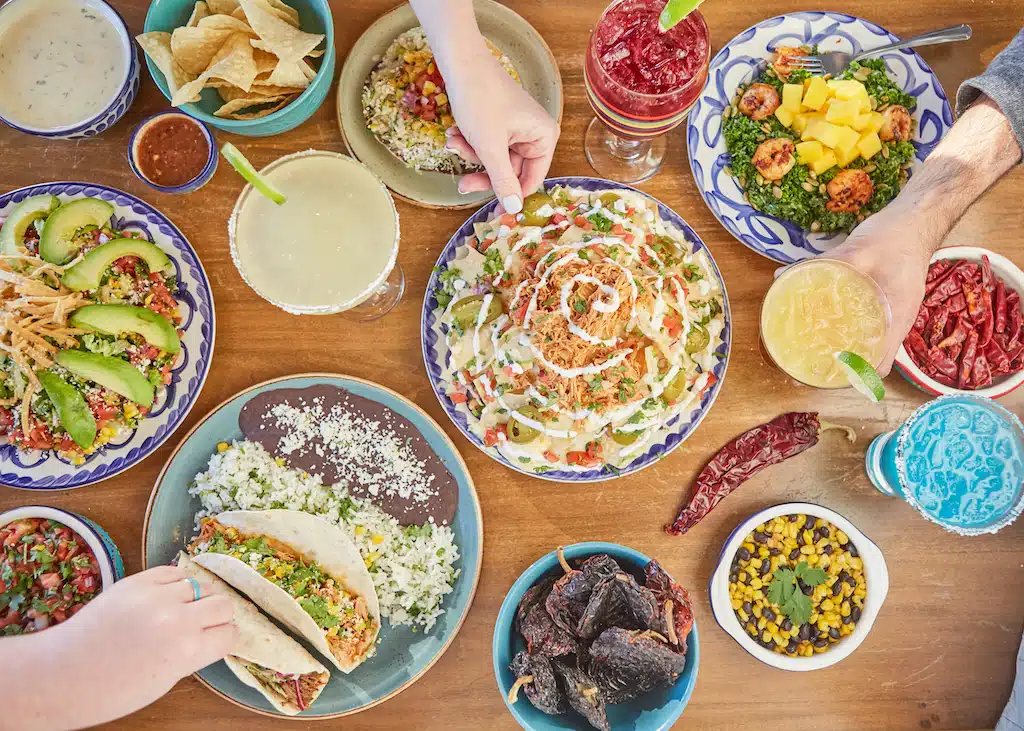
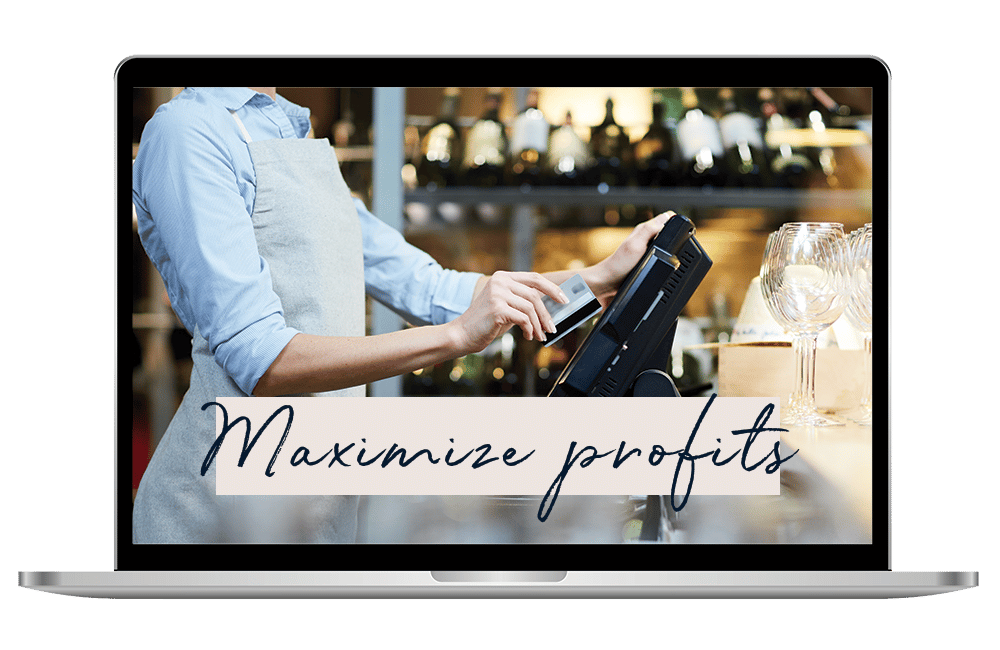
The three costly mistakes you could unknowingly be making?
Find out in this FREE guide and restaurant assessment specifically designed to reveal the unexpected hurdles standing between you and exponential business growth.
Thank You To Our Sponsors

The Employee Retention Tax Credit We will help you determine your eligibility for 2020 & 2021 - Get Started
Fast and easy business financing.
Listeners of the Restaurant Rockstars Podcast receive their loan application fees waived, a $250 value!
Want to become a podcast sponsor?
Please get in touch with Roger at roger@restaurantrockstars.com

